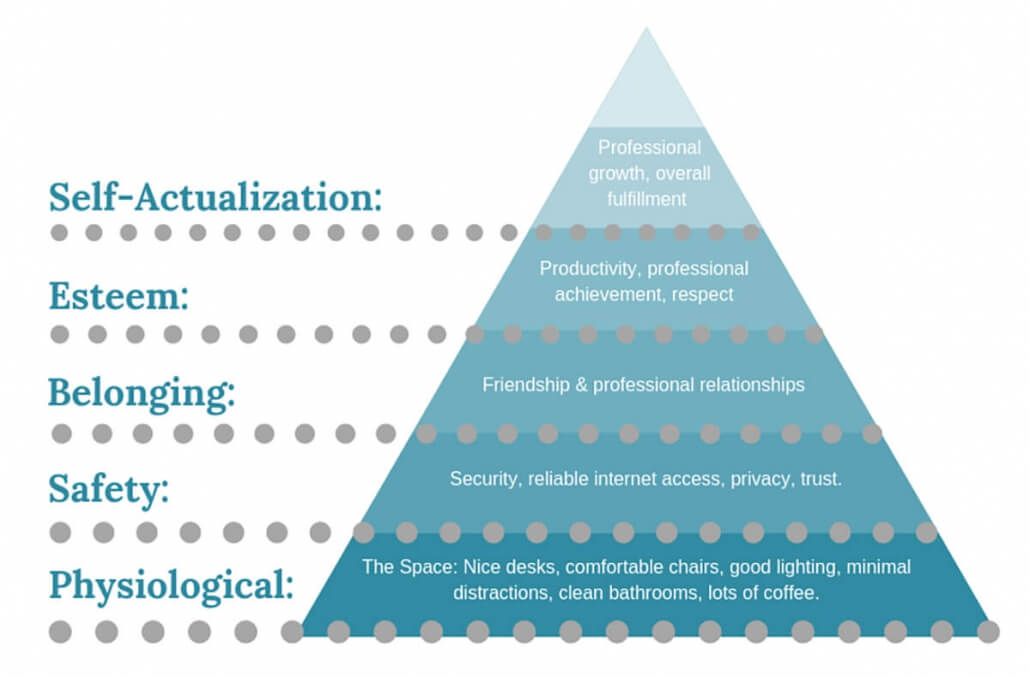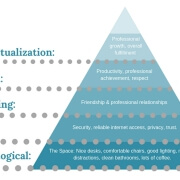Maslow’s Hierarchy of Needs for Coworking
Coworking spaces pride themselves on offering a great workspace and communities of peers to work around. Building and maintaining a thriving coworking community requires an understanding of what members need in order to be productive.
What is it that members of coworking spaces need? At the most basic level, a place to get work done. Better than they could find at home, the local coffee shop, or their company headquarters.
Is that all they need? What is it that motivates someone to pay for a membership at a coworking space? Am I providing it? As the owner of a vibrant coworking space, this is a question that I return to on a daily basis. It drives every business decision I make. If I didn’t continuously evaluate this question, I would lose members and my revenue source. In the coworking industry, members are everything.
To explore this more deeply, I’ve turned to Maslow’s Hierarchy of Needs, a positive theory of human motivation first proposed by American psychologist Abraham Maslow in his foundational 1943 paper. The theory outlines both the basic needs of human beings as well as the order in which they need to be satisfied for a person.

Maslow’s Hierarchy of Needs, adapted for members of coworking spaces.
The needs, which I’ve adapted for members of coworking spaces, are categorized by Maslow as physiological needs, safety needs, needs for love & belonging, esteem needs, and self-fulfillment or self-actualization.
Basic needs
Physiological – Physiological needs are the most fundamental. They pertain largely to requirements for personal comfort. In a coworking space, this starts with the quality of the physical space itself. A coworking space must have nice desks and comfortable chairs that are conducive to working at a computer for long hours. There should be good lighting, comfortable temperatures, good air quality, and clean bathrooms. The environment should have minimal distractions to allow for focus and concentration. And coffee is a must. Lots of coffee.
Safety – First and foremost, safety and security for coworking members means trust. Trust that there will be reliable internet access so they can do their jobs and maintain their own personal financial stability. Trust in a safe building, through access control, security cameras, or well-established community rules and good staffing to assure members of their privacy and personal security while they are at work. And trust that their interests will be taken into account when changes are being made to the work environment.
Psychological needs
Belonging – As humans, we need love. Beyond our family and social circles, we need to feel a sense of belonging in our larger circles, including our professional ones. Professional relationships can combat feelings of isolation and loneliness. Sometimes, just being around people is helpful.
Esteem – Professionally, coworking members are seeking to be productive in their jobs or careers. They want to achieve their professional goals, and thereby receive respect and recognition for those accomplishments.
Self-fulfillment needs
Self-actualization – Self-actualization is narrowly defined by Maslow in the following way, “This tendency might be phrased as the desire to become more and more what one is, to become everything that one is capable of becoming.”
A coworking space, or any business, that serves the higher and largely intangible needs of their customers will be rewarded with a more satisfied, more loyal customer base. And that translates directly to value for a business that is solely dependent upon its members.
As coworking space owners, we should follow this hierarchy consciously and deliberately. It is easy to focus upon the lower levels needs of our members. We spend lots of time and energy picking out the right paint colors, the location of our space, the layout, the furniture, or the artwork. There are building access solutions and policies to help with safety & security and great bandwidth is something I worked on before even picking up paint samples.
Meeting psychological needs is the reason many professionals choose to pay for a coworking space. The basic needs around physical space and safety can often be met at a home office, but friendship and professional relationships become more difficult when working for long hours in isolation. Coworking spaces offer a great way for freelancers and distributed workers to maintain positive professional social connections.
As Maslow wrote, “if all the needs are unsatisfied, and the organism is then dominated by the physiological needs, all other needs may become simply non-existent or be pushed into the background.”
The fastest way to lose members is not meeting their basic needs.
It’s clear that a member that can’t find a private place for a phone call, experiences intermittent connectivity, or can’t stand the fluorescent lighting has a likelihood of canceling their membership. Less obvious is a member leaving as a result of their psychological needs not being met. A coworking space that is making adjustments only in the snack cupboard and is not putting enough effort into fostering potential interactions among members is missing a key component of member retention.
Determining where to focus efforts as a coworking manager and also discerning between what will impact a physiological need and a psychological one is hard. It can feel a bit like whack-a-mole tending to everything members ask for. That is, if you don’t have data to help you see what the needs actually are. Will your members talk to one another more if you offer a big after-hours event, or if you simply put out donuts & bagels one morning? If you are spending too much time tracking invoices and expenses, do you have the bandwidth to create a new customer pipeline for your unused meeting space? Do you know how often your meeting space is being used?
Having a complete picture of how your members are using the space is the only way to know how to meet their needs, from the most basic needs like lighting and furniture, all the way to helping them achieve self-fulfillment.
Achieving one’s full potential even partially as a result of where you work is where things get really interesting, and the research is clear – people that work from coworking spaces thrive. According to research conducted by a team of productivity researchers, members of coworking spaces see their work as meaningful, they feel in control of their job and their work, and they feel a sense of community.
Having a great workplace with a strong community, members have the bandwidth to focus upon their self-fulfillment. One of the largest factors that the researchers attributed the higher levels of productivity to was the autonomy enjoyed by workers in coworking spaces. When someone is able to bring their whole self to work and is not bogged down by unmet lower level needs, they are able to bring the best of their energy, their creativity, and problem solving skills to their work.
A coworking space that can help their members achieve this type of outcome is one that will enjoy high levels of member satisfaction, retention, and the best business outcomes.

